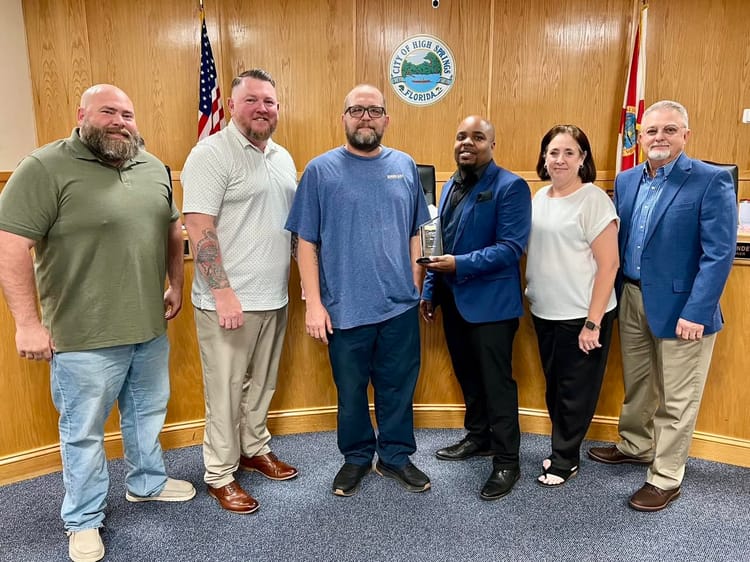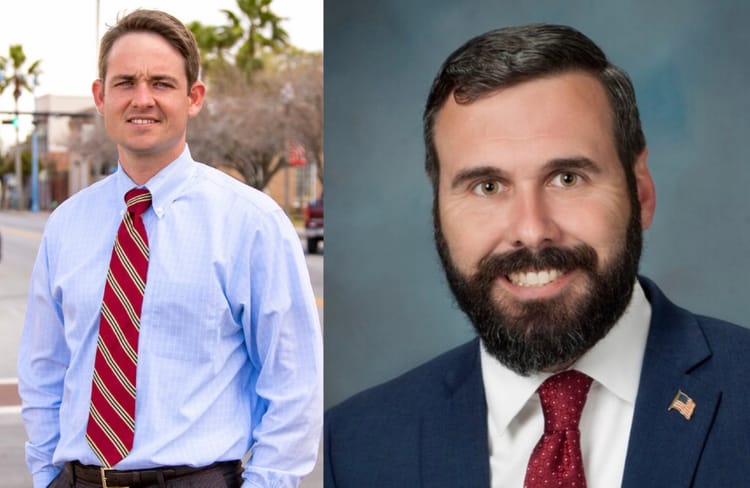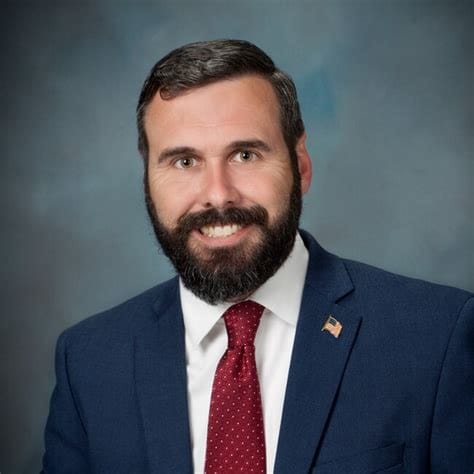High Springs Commissioners Discuss Finances, Issues Arise
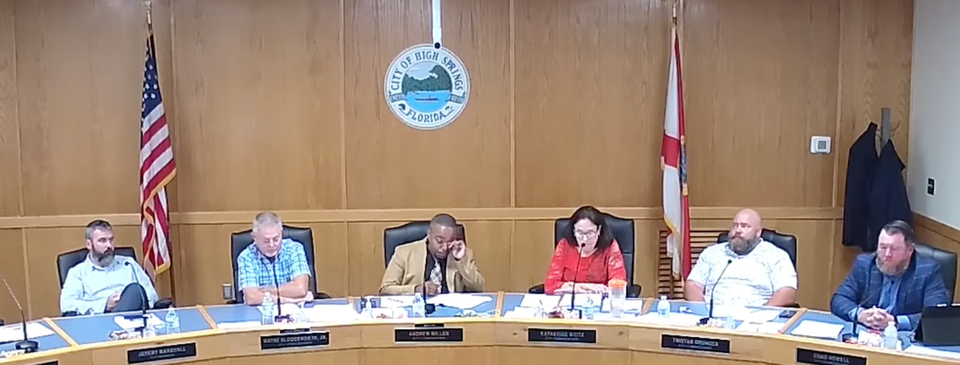
The City of High Springs commission discussed their financial situation at a public meeting on Thursday, November 13. What started as a normal city commission meeting soon developed into a discussion of multiple financial problems, with a years-old invoice standing at the forefront of the conversation.
The commission moved to accept a grant from the from the Florida Department of Law Enforcement (FDLE), to approve budget a procedural amendment to their budget, and to pay a years old invoice with emergency funds.
FDLE Grant
High Springs Police Department Chief J. Antoine Sheppard announced their approval for a grant of $65,000 from the FDLE.
Sheppard said, “It is a residual grant. We got a contact from the FDLE who said, ‘Hey, we got some left over money.’ Our agency jumped on it immediately, which is good because within the first 30 days those funds have dried up, and all other agencies in our area were unable to acquire that funding.”
Sheppard said the grant will be used to improve ten radios, which he said are 16 years old, and that some will be donated to the High Springs Fire Department because they have no spares.
Sheppard said the radios they’re getting are “very reasonable in cost” and “not exactly where we wanna be in terms of technology.” Sheppard said they’d prefer smart radios, but the city is not able to afford them, causing difficulty with communicating inside of schools.
Former High Springs mayor and recently re-elected commissioner Tristan Grunder, who is also a Gainesville Police Department (GPD) sergeant, told Sheppard, “Our goal in the future chief is to get you those smart radios. We’ve got them at GPD, and they are a game changer whenever you’re in that hot moment and you’ve gotta find somebody and you can look at the GPS right there on the radio. I really want you guys to get those in the future.”
Grunder added that Sheppard has been “killing it with the grants” and that it's what High Springs “needs right now in this moment.”
Budget Amendment
High Springs Finance Director Diane Wilson spoke on an amendment to the current city budget, which she explained is an annual procedure to make sure the final approved budget is more than their expenses.
Wilson said the city will be collecting insurance money from several police vehicles that hit deer, a parks and recreation pickup truck that burned down to the ground and a canopy and fire equipment that were destroyed during Hurricane Helene.
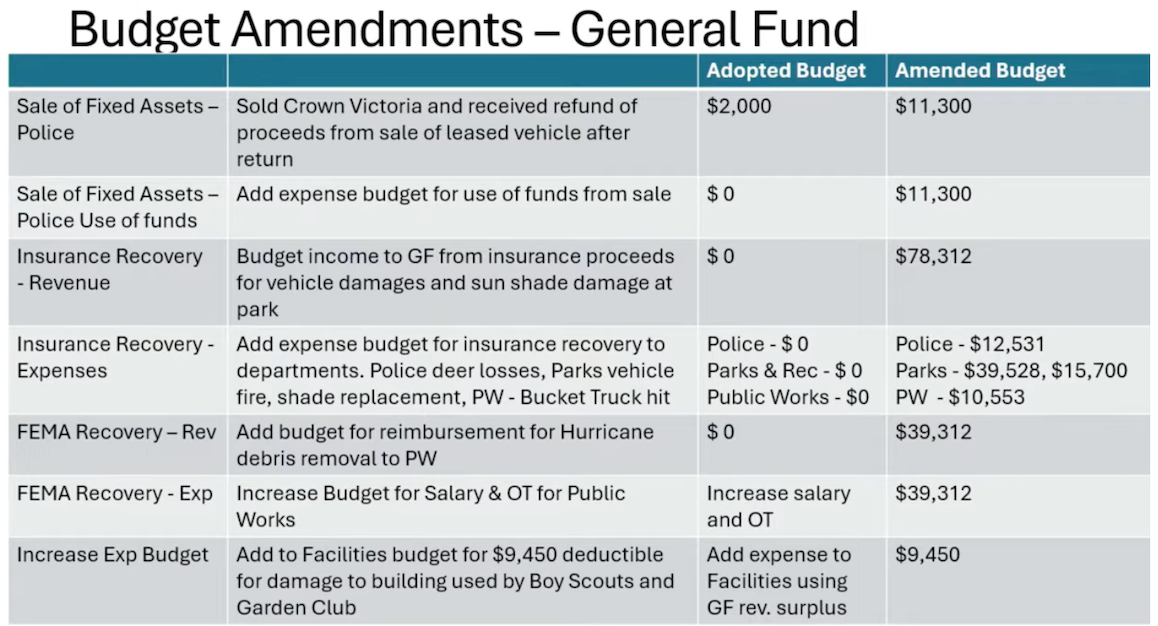

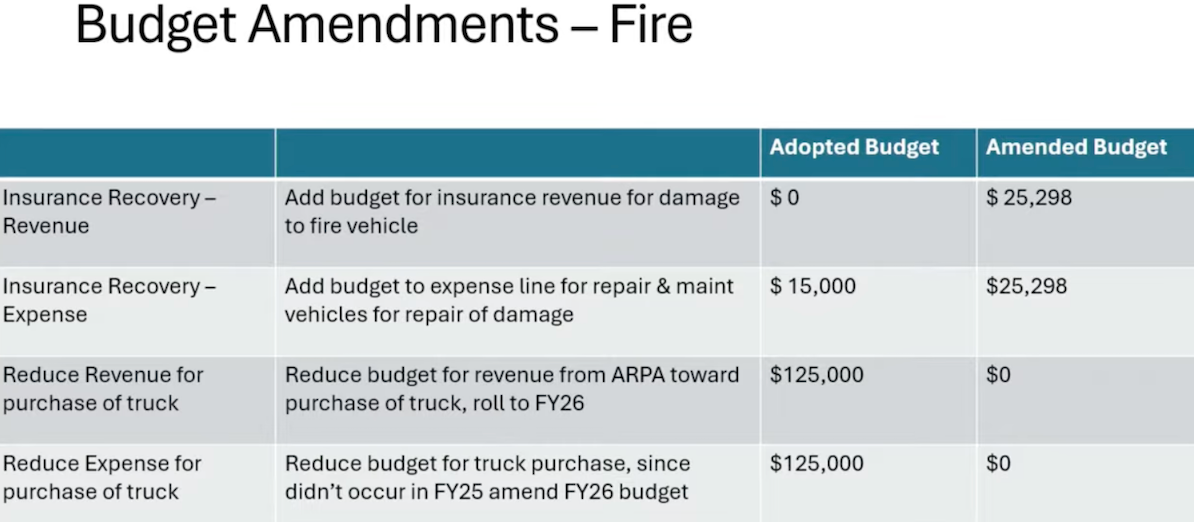
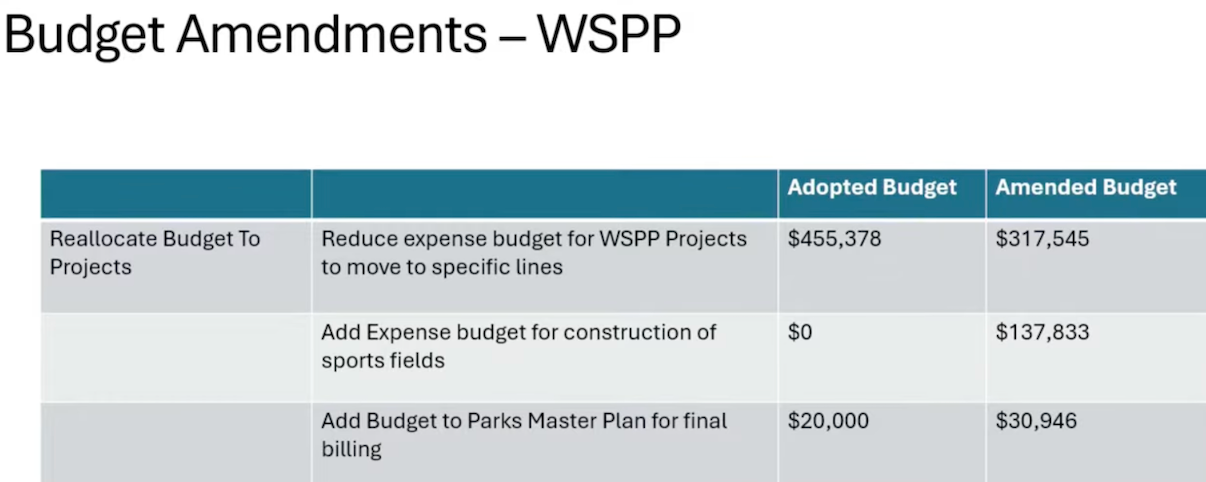
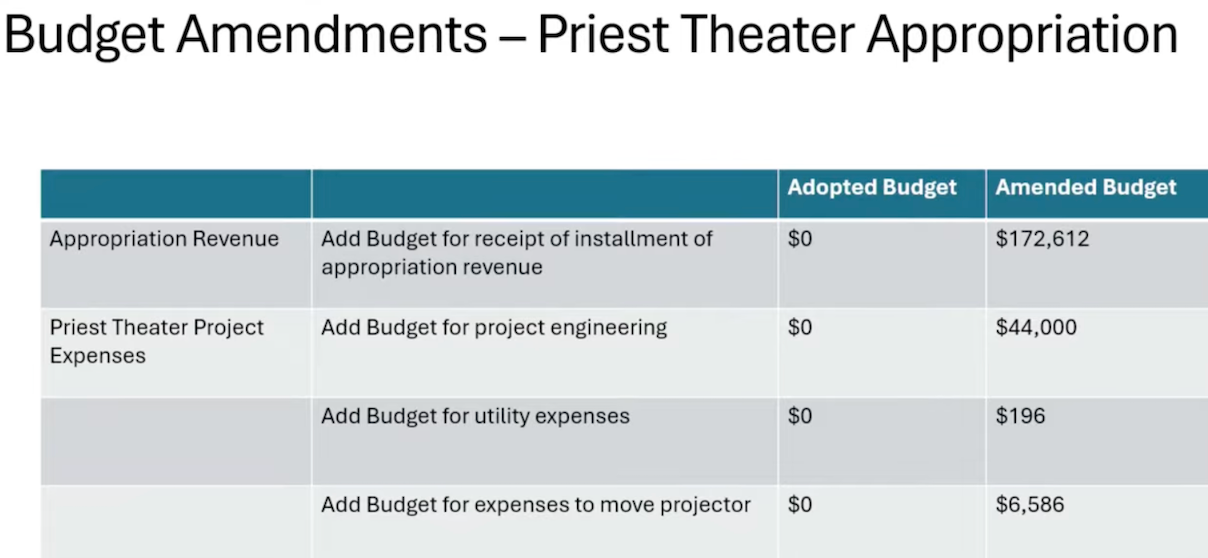
High Springs Mayor Andrew Miller asked how long the city plans to continue hiring contractors to help with finance.
Wilson said, “We should be done after this year. I would say less than six months. They’ve helped us kind of untangle what was going on with the chart of accounts. We’ve made corrections to the years we’ve already gotten though. We're finishing 24’ now and about to start 25’. In the process of doing 25’, they’re going to help us reset the chart of accounts, where we reset incorrectly on the chart of accounts back in 22.’ It's been really difficult because we've been going back in time, and it's really hard to go back and change that chart of accounts historically.”
Grunder asked for more information on wastewater impact fees.
Wilson said during fiscal year 24’ they used $960,000 in the sewer budget for operating and then used $394,000 in fiscal year 25.’
Clip from City Commission meeting (High Springs)
Years Old Invoice
“Maybe I missed it. Maybe I should’ve known it was there.”
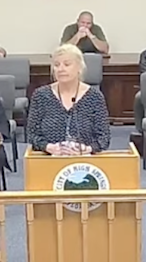
Commissioners discussed an unexpected invoice of roughly $900,000 from Evoqua Water Technologies (EWT).
Clip from City Commission meeting (High Springs)
Explaining the invoice, City Manager Jeremy Marshall said, “This was an invoice we got for the sewer project, and the bill was from two years and nine months ago, so we found out, we’ve been emailing the vendor to ask why it's so late. The reason it's late—it was not late—is when we did it–this bill is for the construction of... the new tank and then the rehab of the old tank. The way the contract was written, they couldn’t bill until it was completed.”
“In order to pay this bill at the end of the month, we will need to use the cash out of the emergency fund,” said Wilson, who went on to say, “We don’t have $900,000 sitting in the general fund for such an emergency… Instead of having something break, we got a bill we didn’t expect. It's really no different than if we had a huge sewer leak and it cost us $900,000.”
Wilson added that the emergency payment would “clean out” the city’s cash but that they’ll still have property taxes and monthly bills coming in, in addition to a $160,000 reimbursement for prior payment to the wastewater treatment plant.
Wilson said she would “rather have a bill than an accident,” and that the situation solidifies their need to “speed up” a “short-long term” plan.
“So what this bill actually means is that the project went about $1 million over budget,” said Commissioner Katherine Weitz.
Wilson responded, “What I’ve learned since we started this is that back in early February 2023 it was identified that we would be paying this bill out of our matching fund, so to speak. That bill totally went off the radar for me. That whole amendment was done by management. We didn’t have it in our files. Maybe I missed it. Maybe I should’ve known it was there. I very well could’ve missed it. I’d been here about six months and was still trying to figure out what was going on. I may have missed it; I don’t know. The documents that I've gotten since we got the bill and started doing research, we did not have downstairs in finance. For whatever reason, that's why I don't know.”
Weitz replied, “I understand that the goal from talking to Mr. Marshall was to carve off the purchase of that large budget item to have the city buy it directly to avoid paying sales tax on it… At some point in that process, that large purchase was never reconciled to your office, to the engineer, that we still have $1 million that we're going to have to pay. That never reconciled.”
Clip from City Commission meeting (High Springs)
Commissioners asked project engineer Jarrod Petrohovich to come up to the stand to give more information on the bill. “It was always in the budget from our standpoint,” he said.
Petrohovich said, “When the project bids first came in, you had $6 million in grant funds. Phase one of the project bids came in around $9 million. So, the city pledged at that time to move the project forward and award the construction contractor $3 million between ARPA [American Rescue Plan Act] and impact fees and $6 million from the grant funds. There was a phase two of the project, and DEP [Department of Environmental Protection] and Suwannee River Water Management District really wanted to see the project come to fruition due to the environmental benefits and the need for capacity. It's one of the largest infrastructure projects in the city's history, doubling the plant’s capacity. We went back to DEP, worked with city staff; they awarded an additional $4 million that allowed phase three to come into play, which was $3 million… At the end of the day, the project was about $10 million in grant funds and $2 million in city funds that were pledged, so that’s a good deal.”
Petrohovich said the city saved $100,000 by pursuing the purchase through a direct owner purchase process, and that equipment costs identified by the city totaled around $1.6 million, which counted towards the city’s $2 million pledge. Petrohovich said that after the purchase orders were submitted, it was off their financial radar and the city’s responsibility.
Wilson said that when secondary funding for the project came in, the then-city manager advised they were awarded more money. She said communication was bad at the time, and she was “still trying to figure out where all the money was.” Wilson added that she “never saw” the change order of $1 million.
Weitz asked Marshall his spending limit, as he’s authorized to sign checks, and he said $25,000.
“This is a $900,000 purchase order that was signed,” said Weitz.
Wilson interjected, stating the purchase order was $1.1 million, that $100,000 was paid up front, and they recently paid $50,000.
Commissioner Chad Howell asked for further confirmation on the bill being paid in part, and Wilson said that to her “understanding,” $100,000 was paid when the purchase order was first signed. She said that a couple weeks ago they paid “another portion” that was $52,000, and that was “about the same time [they] got the $900,000 bill.”
Weitz asked if the $52,000 was a separate bill, and Wilson said they paid the project in separate components.
Miller said, “This bill was due September 10. That means you got this bill in August.”
“No, we just got it,” said Wilson.
“You just got it when?” Miller asked.
Wilson said they got the bill on September 22, and they’ve been trying to “research and figure out what was going on.”
Miller brought up that there is a $15,000 late fee, and Wilson said they’re negotiating with contractors about the payment.
Grunder asked how there wasn’t a system to notify them of the bill and how their auditors didn’t catch it, and Wilson said she agreed and they’re trying to figure it out.
Weitz said, “I recall just happenstantially in chambers before a meeting asking the previous public works director how the project was going, and his answer was something like, ‘I wouldn't know.’ ‘What do you mean you wouldn't know?’ ‘Well, I'm not allowed to go to the construction meetings.’ ‘What? What do you mean you're not allowed to go to the construction meetings?’ Now this was a casual conversation. I was not directing him. I was not violating charter, so let's get that out there right now. So, I invited myself to the next construction meeting. I've met Jared a couple of times. I was denied access to that meeting by Mr. Marshall's predecessor very directly. I was not permitted to attend. I was allowed to go to a meeting afterwards. There was a special meeting just for me afterwards because I’ve been asking about the budget all along.”
Weitz said she received copies of attendees of the construction meetings and nobody from city hall was present, calling it "inadequate representation." She still thanked the construction group, saying, “The number of sinkholes those guys are chasing out there, people probably aren’t aware of.”
“This is not a shot at you; this is something else,” Grunder told Petrohovich.
Marshall said communication with the contractors hasn’t been great, and they’re meeting soon to discuss the late fee.
“A lot of this happened when I was out,” said Wilson.
“When you were on administrative leave for three months when you were sent home,” said Weitz.
Clip from City Commission meeting (High Springs)
Wilson said, “That is correct. I was out from the middle of December to the middle of March, and if you look at all the memos of the budget changes, that’s when I was out. I just didn’t know about it.”
Howell asked how the city was able to function without a finance director, and Wilson said she did not know and wasn’t allowed to work.
Weitz said the issue reflects on a previous problem where city staff continued using an elevator after it required fire suppression. “For three months or so we were not supposed to be using the elevator, but it was being used anyway,” she said. “That project, I think, went 100% over budget. That was never brought back to the commission... We found that out long after the fact, so those spending practices were happening every day, and we were not told.”
As the meeting continued, Wilson said, “This is why audits are late. This is why my job is so hard. This is the disaster I’ve been trying to square away… Every single day something else comes up that we didn’t know about or had no control over. Or I knew about it, and I tattled on it, and I got sent home for three months because I reported this wrongdoing, and nothing happened.”
Wilson said she doesn’t have a staff of accountants and that the job is hard with just herself and an assistant. She said she has to post things “in the best way you can in the crappy system that’s set up and then still try to continuously go back and fix it.”
Although frustrated, commissioners acknowledged they didn’t have any other choice but to pay the bill, and Weitz motioned to do so using emergency cash reserves “with a singular focus on how to bolster those reserves again.” The motion was approved unanimously after public comment.
Public Comment
“Is there a reason she has more information about this than I do?”
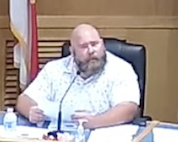
During public comment, the former mayor of High Springs, Sue Weller, gave further background information on the purchase orders for the wastewater project, also sharing the timeline on social media. According to her, this is the timeline of the project:
January 2023 - High Springs is awarded a contract for the wastewater treatment facility and wetlands project. The city approves using grants, with $1,040,000 coming from ARPA, $960,000 from impact fees, and $833,591 from new development impact fees or city contingency funds.
February 2023 - The wastewater treatment purchase order was issued for WWT plant equipment in the full amount of $1,055,131.
September 2023 - The city decides to buy equipment directly to save $95,000 on taxes, which included equipment from EWT. Change order #1 was issued to decrease the original contract price from $1,535,883.
December 2023 - The city received an invoice from EWT for $105,513.10
January 2024 - The city issued a check to EWT as a 10% down payment for $1,055,131.
May 2024 - The city receives an email from Mittauer, a consulting firm for EWT, providing a brief history of the project, explaining the city had pledged $1,040,000 in ARPA funds and the $960,000 from existing impact fees. The same email said a meeting was scheduled that month with the city manager and staff to discuss the project history/funding breakdown.
September 2025 - The city receives two invoices from EWT, one for $896,861.35 and the other for $52,756.55.
October 2025 - The invoice of $52,756.55 is issued.
Weller said that presumably in February 2023, that finance department would’ve noted $1,055,131 when the purchase order was issued, or if not, in September 2023 when the billing change was issued. She said they also should've had prior notification in May 2024.
“It should not have been a surprise. It was known by the administration, and now you’re stuck with it,” Weller said.
“Ms. Weller, where’d you get all that information?” Grunder asked.
Weller said she contacted EVO directly, which sent her the initial purchase order, before then asking the city for everything to do with the purchase order through a public records request.
Looking towards the city manager, Grunder asked, “Is there a reason she has more information about this than I do?”
Clip from City Commission meeting (High Springs)
Janet Evans spoke following Weller and said the city should name the people responsible for financial issues they’re experiencing. “People are just livid,” she said. “And a new day, what’s going to pop up next… I know everybody tries to be professional and tries to be nice about it… ‘Well, they didn’t mean it…’ I think people are tired of hearing that. I want to start saying, 'Who are these people, and what can be done?' If you can’t do anything towards them, I want to hear their names.”
Marshall responded, saying he discussed with staff that on Monday that they’d “start looking at ‘how did it happen,’ ‘who’s accountable,’ and what not.”
Marshall said, “I don’t have names,” before clarifying, “I have names, and I have facts to back it up, but I don’t have all the facts, and I don’t have all the names. There might be more people involved.” Marshall said he’s spoken with a city attorney, saying, “Once we get further along in our process to see how this happened and who’s accountable for it, we will see if there’s steps we can do to make people accountable throughout this.”
Miller asked Marshall what the accountability process would look like.
Marshall said they’d establish a timeline, look at emails, and find where the process broke down.
Clip from City Commission meeting (High Springs)
Marshall said he would look at all the emails between the prior city manager, their assistant, the previous public works director and finance director, in addition to all emails from Mittauer about funding.
Feb 1, 2026: Corrected error in timeline presented during public comment listing Sep and Oct 2025 as 2024.




